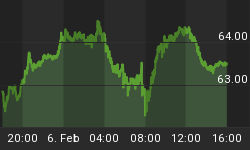The Baltic Dry Shipping Index covers dry bulk shipping rates and some view it as a proxy for general economic health. The index continues to collapse.
Baltic Dry Index

Notice that the indicator is back at levels not seen since 2005 and is below levels seen in 2004.
Shipping Lines Tight
Bloomberg is reporting Shipping Lines Say Tight Credit Cutting World Trade.
Pacific Basin Shipping Ltd., Hong Kong's biggest dry-bulk carrier, and Precious Shipping Pcl. said demand for moving coal, iron ore and other commodities will fall because banks are guaranteeing fewer loads.
"Letters of credit and the credit lines for trade currently are frozen," Khalid Hashim, managing director of Precious Shipping, Thailand's second-largest shipping company, said in Singapore yesterday. "Nothing is moving because the trader doesn't want to take the risk of putting cargo on the boat and finding that nobody can pay."
My Comment: Khalid Hashim has this backwards. Nothing is moving demand is falling like a rock. Who in their right mind is not cutting back production in the face of the biggest consumer led recession in history?
The lack of letters of credit, in which banks guarantee payment for merchandise, could become a "big issue" for world trade, according to Klaus Nyborg, Deputy Chief Executive Officer at Pacific Basin. Tighter credit has contributed to this year's 80 percent drop in the Baltic Dry Index, a measure of commodity-shipping costs. About 90 percent of world trade moves by sea.
The Baltic Dry Index dropped 8.5 percent to 1,809 points yesterday, the lowest since August 2005. Pacific Basin dropped 6.5 percent to HK$4.75 in Hong Kong and Precious Shipping declined 5.5 percent to 12.1 baht in Bangkok.
Banks worldwide have curbed lending because of increased concerns about getting their money back. Shipowners are already struggling to obtain funding for new vessels. Precious Shipping took as long as 15 months to secure financing for 18 vessels it has on order, Hashim said.
My Comment: Those lending who are not extremely concerned about getting their money back are the precisely the ones who will not get their money back.
The maritime sector needs about $300 billion over the next three to four years to fund construction of vessels that are already on order, according to Nordea Bank Finland Plc. At least a quarter of container ships, dry-bulk vessels and oil tankers on order are not financed, according to Seaspan Corp., the Hong Kong-based ship lessor.
My Comment: The shipping sector is transitioning from huge undercapacity to overcapacity just as housing did in 2005. That is why rates are falling.
Note that the apparent shipping undercapacity was actually a mirage predicated on easy monetary policy by Central Banks, fueled by insanely low lending standards by banks. Artificial crack-up booms create the illusion of shortages and malinvestment of capital is always the final result. The new supply of ships is coming out at exactly the wrong time is proof.
Swings in the London interbank offered rate, which lenders typically use as a base for writing new loans, have made it difficult to decide what price to charge new customers.
"The banks cannot fund at Libor rates at the moment," said Keishi Iwamoto, head of shipping for Asia at Sumitomo Mitsui Banking Corp. "The question is how do we tackle the additional costs for lenders."
German banks with funds to lend are offering about 200 basis points above Libor, double previous rates, while in Singapore the rate is plus-350 points, according to Tobias Koenig, managing partner of Koenig & Cie. In the main though, shipping lines aren't able to borrow, he added.
My Comment: For a detailed look at LIBOR conditions, please see LIBOR and the TED Spread Still Show Extreme Stress.
"There is no rate because all banks are closed for business," he said. "You have a few banks rescuing their best customers, but that's it."
Banks Closed For Business
"There is no rate because all banks are closed for business."
The smart banks should be closed for new business. I am sure there are some exceptions in medical businesses, bankruptcy related businesses, or small niche markets in other places, but for the most part, Compelling Banks To Lend At Bazooka Point is exactly the wrong thing to do.
The US is in a recession, consumers are cutting back discretionary spending, there is rampant overcapacity in every sector but energy, and there is no reason to go on a lending spree. Furthermore, there is no reason for any qualified buyer to want to borrow. Why would any responsible party want to expand in this environment? The only people who want to borrow significant sums of money now are the very people banks should not want to lend to. Thus the best thing banks can do with that money is sit on it.















